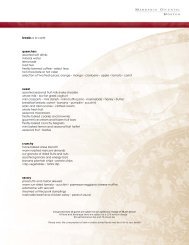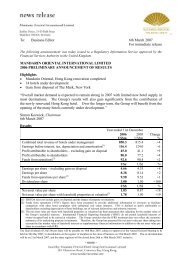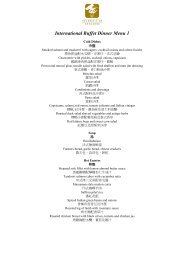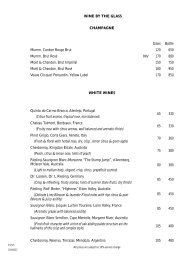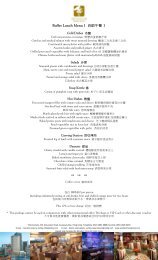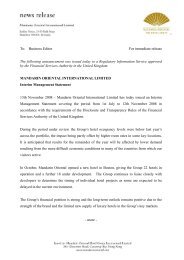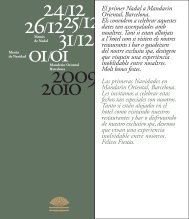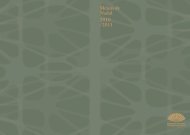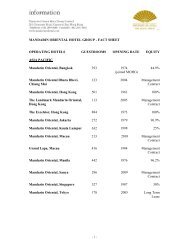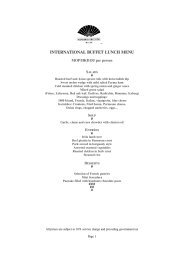Annual Report 2011 - Mandarin Oriental Hotel Group
Annual Report 2011 - Mandarin Oriental Hotel Group
Annual Report 2011 - Mandarin Oriental Hotel Group
You also want an ePaper? Increase the reach of your titles
YUMPU automatically turns print PDFs into web optimized ePapers that Google loves.
Corporate Governance<br />
<strong>Annual</strong> <strong>Report</strong> <strong>2011</strong> 77<br />
<strong>Mandarin</strong> <strong>Oriental</strong> International Limited is incorporated in Bermuda. The Company was established as an Asian-based<br />
hotel group and has since extended its operations to key locations around the world. The Company’s equity shares have<br />
a premium listing on the London Stock Exchange, and secondary listings in Bermuda and Singapore. The Company<br />
attaches importance to the corporate stability that is fundamental to the <strong>Group</strong>’s ability to pursue its long-term<br />
development strategy. It is committed to high standards of governance. Its approach, however, developed over many<br />
years, differs from that envisaged by the UK Corporate Governance Code (the ‘UK Code’), which was originally<br />
introduced as a guide for United Kingdom incorporated companies listed on the London Stock Exchange. As provided<br />
in the Listing Rules issued by the Financial Services Authority in the United Kingdom, the Company’s premium listed<br />
status requires that this <strong>Report</strong> address how the main principles of the UK Code have been applied by the Company,<br />
and explain the reasons for the different approach adopted by the Company as compared to the UK Code’s provisions.<br />
The Company’s governance differs from that contemplated by provisions of the UK Code on board balance and<br />
refreshment, director independence, board evaluation procedures, nomination and remuneration committees and<br />
the appointment of a senior independent director.<br />
The Management of the <strong>Group</strong><br />
The Company has its dedicated executive management under the <strong>Group</strong> Chief Executive. The Memorandum of<br />
Association of the Company, however, provides for the chairman of Jardine Matheson Holdings Limited (‘Jardine<br />
Matheson’) to be, or to appoint, the Managing Director of the Company. The managing director of Jardine Matheson<br />
has been so appointed. Reflecting this, and the 74% interest of the Jardine Matheson group in the Company’s share<br />
capital, the <strong>Group</strong> Chief Executive and the Managing Director meet regularly. Similarly, the board of the Hong Kongbased<br />
<strong>Group</strong> management company, <strong>Mandarin</strong> <strong>Oriental</strong> <strong>Hotel</strong> <strong>Group</strong> International Limited (‘MOHG’), and its finance<br />
committee are chaired by the Managing Director and include <strong>Group</strong> executives as well as the deputy managing director,<br />
the group finance director, the group strategy director and the group general counsel of Jardine Matheson.<br />
The Board<br />
The Company currently has a Board of 17 Directors: the <strong>Group</strong> Chief Executive and Chief Financial Officer; seven<br />
executives of Jardine Matheson; and eight non-executive Directors. Their names and brief biographies appear on<br />
pages 24 and 25 of this <strong>Report</strong>. The Chairman has been appointed in accordance with the provisions of the Bye-laws<br />
of the Company, which provide that the chairman of Jardine Matheson, or any Director nominated by him, shall be<br />
the Chairman of the Company. The composition and operation of the Board reflect the Company’s commitment to its<br />
long-term strategy, shareholding structure and tiered approach to oversight and management as described in this <strong>Report</strong>.<br />
These factors explain the balance on the Board between executive and non-executive Directors, the stability of the Board,<br />
the absence of nomination and remuneration committees and the conduct of Board evaluation procedures. The Board<br />
regards relevant business experience and relationships as more valuable attributes of its non-executive Directors than<br />
formal independence criteria. Accordingly the Board has not designated a ‘senior independent director’ as set out in<br />
the UK Code. Recommendations and decisions on remuneration result from consultations between the Chairman<br />
and the Managing Director and other Directors as they consider appropriate.<br />
Among the matters which the Board of the Company decides are the <strong>Group</strong>’s business strategy, its annual budget,<br />
dividends and major corporate activities. Responsibility for implementing the <strong>Group</strong>’s strategy is delegated to the<br />
Company’s executive management, with decision-making authority within designated financial parameters delegated<br />
to the MOHG finance committee. In addition, as part of the Company’s tiered approach to oversight and management,<br />
certain Directors of the Company who do not serve on the board of MOHG and who are based outside Asia make<br />
regular visits to Asia and Bermuda where they participate in four annual strategic reviews. All of these reviews precede<br />
the Board meetings. These Directors are not directly involved in the operational management of the <strong>Group</strong>’s business<br />
activities, but their knowledge and close oversight of the <strong>Group</strong>’s affairs reinforces the process by which business is<br />
reviewed before consideration by the Board.



